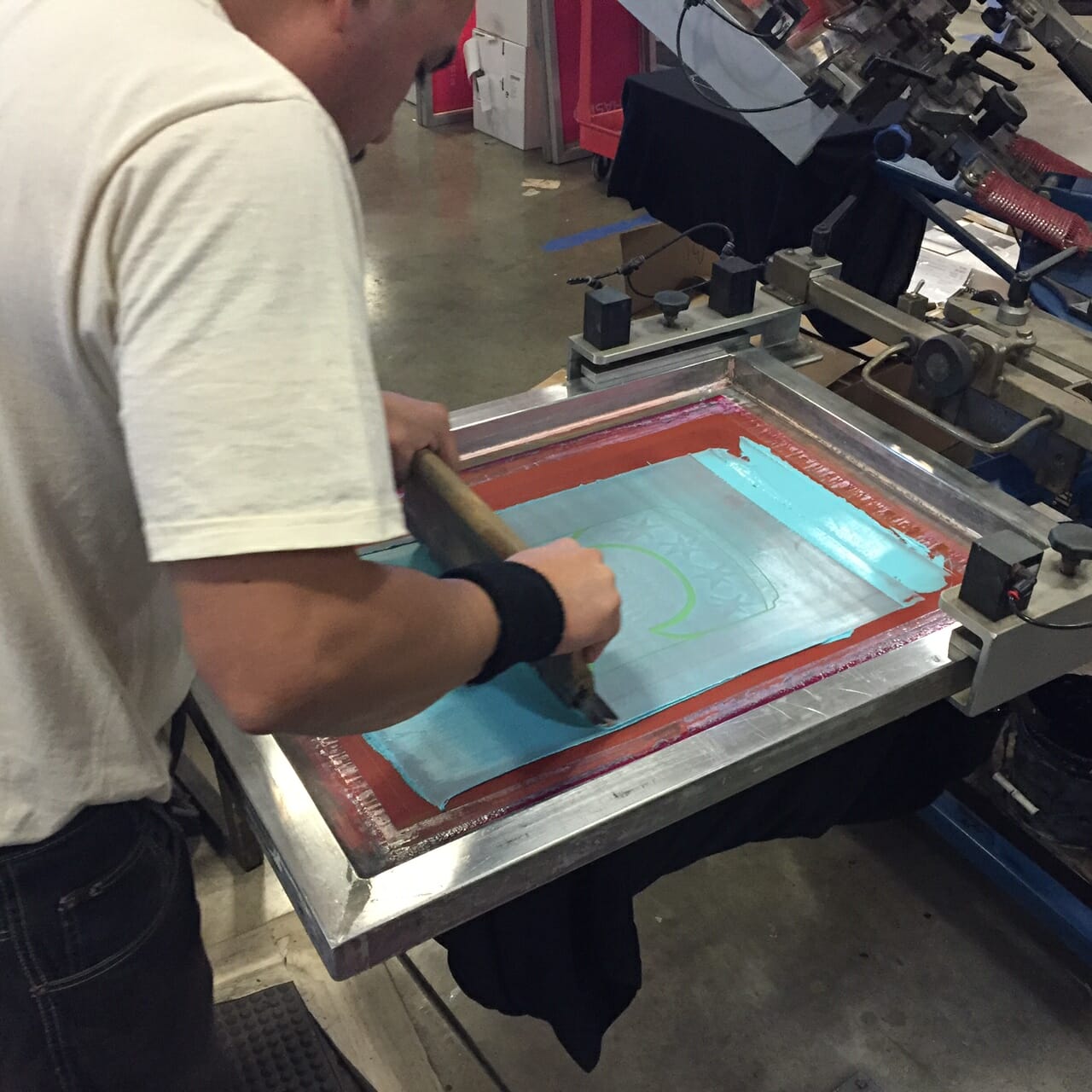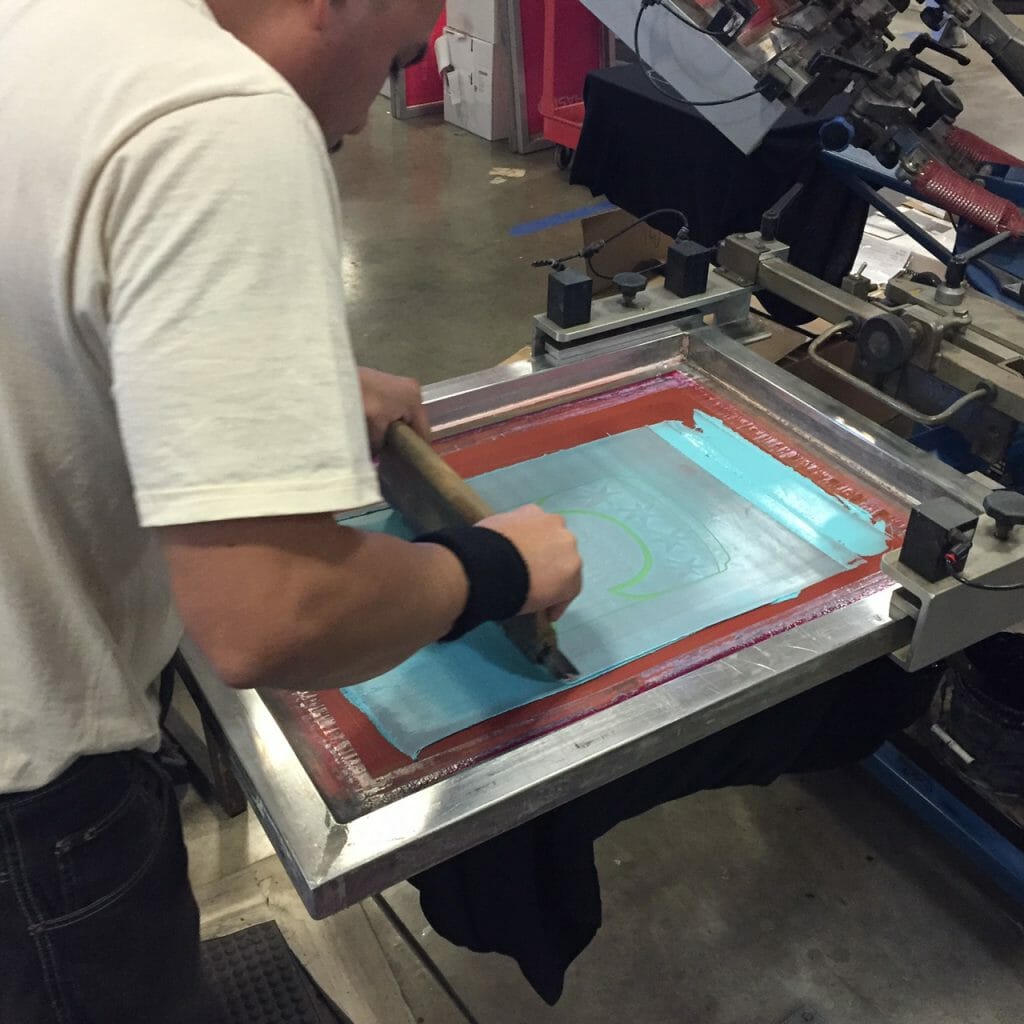
For decorated apparel shops with any decent size there are usually a few people on staff that outshine their coworkers every day. Without much effort, I’m sure you can think about someone on your staff that fits this description. At least I hope so.
They just do all the right things consistently. A few times a week you say to yourself, “Boy I’m so happy that they work here!”
But what if they left?
How big of a hole would that create? Probably enormous. They might be the ones filling your production schedule with orders, or creating those designs your key accounts crave, or producing all the great work on the shop floor. Can you get by without them?
Maybe.
It depends on who is left sitting on the bench. How good is your training program anyway?
So the big elephant in the room is how do we keep that type of talent on our payroll? Here are some strategies that you might employ:
Feedback
Be open and honest with them at all times. They should constantly know what you think about their work, and the impact it has on the company.
For example, I’ve spoken to more than a few folks in this industry that work for family owned operations and they have been really frustrated at the lack of feedback and value that has been shown to them over the years. You would think that family ties would be stronger, but sometimes it doesn’t matter that they are the sons or daughters of the owners. I think they get taken for granted, and in some cases even mistreated. Sound familiar?
Whether it’s a family owned business or a more corporate structure, people like to hear they make a difference. You have to say the words, otherwise they don’t know what you are thinking.
“Oh, that’s crazy talk. They know how much they mean to us!”
Do they?
This just can’t come up during their annual review times either. Want a more positive relationship with your key employees? Engage in conversation with them and provide examples that illustrate that you see what they are doing every day and the influence it has on the company. This doesn’t have to be a sit-down formal meeting either.
Frequent “Hey good job on that” when you catch someone doing the right thing goes a long way to make them happy.
When was the last time you said that? Be honest.
Challenge
People love engagement. They like to learn new ideas or obtain goals by working on things that matter. Got a rockstar or two on your staff? Give them some challenging work that will make a big difference to your company.
Nothing says I trust you and you are important to the company like handing over the work on that key account, tricky job or critical function.
Don’t micromanage them with the task though. Let them do it their way. The reason they are rockstars is that they can do things that are better than everyone else.
Let them shine.
I bumped into a great Steve Jobs quote the other day that I think fits here. “It doesn’t make sense to hire smart people and tell them what to do; we hire smart people to tell us what to do.”
What problem can you solve by handing it off to someone to puzzle it out for you?
The hardest thing that I’ve had to learn over the years has been to let people do things their way. Giving up that control is tough. Here’s the lesson: In a results oriented, performance first culture, the road traveled to finish the journey matters less. Someone else may have a better way. Plus, that challenging task is now complete and you personally didn’t have to work on it.
That’s what delegation is all about, right?
This scores more points at the end of the day than anything you could ever do by yourself. So, shut up and let them do what they do best.
Empty Promises
One thing that will come back to haunt you is making promises to a superstar employee about their future, unless you know for certain that you can keep them. “When things turn around I’ll give you a raise.” or “Six months from now, you’ll get that promotion.”
What will happen is six months from now you may have an even more uncomfortable conversation and let them down. That’s when people abandon their jobs. They lose faith in you. That trust is broken.
Your relationship with your superstar employee is what creates the loyalty. If it is built on a solid foundation of trust, engagement, openness, honesty, and feedback it can be longstanding and beneficial to both the employee and the company. Remember, employees don’t leave companies, they usually leave because of bad bosses or a bad environment.
How do you think you rate?
Promising things just leads to a sense of betrayal. What’s better is an open dialog of honest information. Lay the cards on the table. Hidden agendas, secret goals, and saying half-truths to placate a disgruntled worker doesn’t usually work out well.
Paint the Picture
Another great idea is to include your key staff (and the whole company really) on the vision you have for the company. Where are you going? What does success look like a year or five down the road?
Describe the challenge in detail. Paint the picture of the journey. What do the roadblocks to success look like? What challenges will you have to overcome? How will they fit into the work that is needed to reach those goals?
How can these rockstars help achieve that mission? If you can, focus on the exact things they need to accomplish.
Be specific.
By bringing people together to work on the heroic quest, you give them a bigger picture than just slogging through the next order that’s in front of them. It takes a team to climb a mountain or land a rocket on the moon. Illustrate how their efforts fit into that journey by coming together and working as a team. They matter more than just the work they are doing five minutes from now.
Those rockstar employees can set the example and lead your workforce team to greater goals.
People need to touch and feel that idea that’s in your head. They might even have an idea or two that you haven’t thought about that they would want to contribute.
You would like that, right?
Support
So now you’ve described what they need, illustrated the road that your key goals will travel, and have forged a better relationship. Or at least I hope you have.
What’s the one thing you can do to help them achieve that glory?
Support them.
What do they need? You must make it easier for them to be a success. That has to happen every day.
Do they have the right tools? Is the information that comes their way prepared correctly? Does the equipment they use operate effectively? Is their support crew well trained? Is there absolutely anything you can get them to make their life and work in your company easier? Are they even happy?
Why is this important? Put yourself in their shoes. When they constantly have to ask for that gizmo to be fixed, or the work order to make sense, or remind you to order that thing…what message are you sending them?
When they are sitting around the dinner table at night, do you think they are relating positive stories about their work day? When they describe their job to their friends what do you think they are saying? Have you ever even thought about that?
Want to keep that rockstar? Make a difference to them daily. It’s not about you.
Money
My Uncle Bill has a great line he uses all the time… “Money is the lubricant that greases the skids of life.” How true.
At the end of the day, (or week really) this is what your employees judge your company on. How much they get paid. As much as you don’t want them to, they all talk. People compare to other companies constantly. There are even websites like GlassDoor that facilitate that conversation online. The emperor has no clothes.
If your talent at your company is any good, they are getting offers from other companies all the time. You will never know about them though…until it’s too late one day. Will that be tomorrow?
It is your company culture that is keeping them there working for you. That’s why it is crucial that your culture and work environment experience be the best that you can build. Sure, they might make more money somewhere else…but the other intangibles are unknown. Will the boss be a jerk? What are the people like? What is the commute like, or would they have to sell the house and move across the country? Is there room for advancement, or is the new company stable? Then there’s that insurance question.
At some point, the fear of that unknown tips in favor of looking elsewhere if the employee isn’t being heard or engaged correctly in their job. If the things they like about their job crumble away, what’s left?
Just swinging that pickax against the mineshaft wall. Work.
Don’t get me wrong. What you pay your staff certainly matters. At some point, anyone would leave if enough money is thrown their way. However, research has shown that money isn’t the prime reason people leave their jobs usually.
So should you pay the rockstar employee more? Yes. Definitely. Pay them as much as you can afford, if you think they are that valuable to your company. If you can’t give them a raise, give them a bonus. If they are rockstars they deserve to be treated better than your other employees. It isn’t fair, nor should it be. But if the other employees made the same effort, or had the same skill, they could be at the same level too.
Rockstar Origins
Ok, so maybe you’ve read this far into the article and thought to yourself, “Hey, that’s great but I don’t really have anyone that’s a rockstar employee. What then?”
What then, indeed? Where do these incredible employees come from anyway? There are only two ways to get them. Hire them. Train them.
What if you find someone that you know is a rockstar, but you don’t have a position open for them at the moment? You hire them. If there is someone out there that’s better than your staff, and you know will come in and day one make a huge difference to your company…you do what it takes to bring them on. This type of hire instantly gives your company credibility. Other employees will have to raise the bar on their game to be at the same level. Think about all the opportunities this will generate within your walls for expanding your excellence and adding to the culture that you are trying to build!
So where are these rockstars anyway? They are out there. They have profiles on LinkedIn. They participate in industry Facebook groups or shirt boards. They post on Instagram or Twitter. If you are on social media, you may have seen some of their posts. They ask and answer questions, spark debate or maybe complain about something. You can also find them with a recruiter, or just simply by posting an open position ad. Just pay attention. They may have already contacted you at some point too. This industry isn’t that large.
Constantly demonstrate why your shop is the best, and why adding them to the team matters. Players want to get into the game with a championship team. They can see the trajectory and want to be part of something that will take them on a fantastic journey. People want to make a difference.
If you are going the training route, that takes longer. It’s like growing crops in your garden. You are going to have to invest in time, money and patience. Hire for attitude, train for skill. So, first look for that person that’s always curious. Always willing to work, and do the hard things with a smile. That’s the one that you send to classes, or move around the shop getting experience absorbing different techniques and challenges. Like a crop, you have to tend to them. Make them understand that learning is key to their growth. Lay a career path in front of them so they can comprehend what’s needed in your shop and the goals. It’s OK if they are a little rough around the edges; it is the long term payoff that you are shooting for here.
Regardless of how you cultivate your best employees, it is crucial that you keep them engaged, happy, and motivated. Ignore them at your peril.
“We are what we repeatedly do. Excellence then, is not an act, but a habit.” – Aristotle
“Always treat your employees exactly as you want them to treat your best customers.” – Stephen R. Covey
“Appreciate everything your associates do for the business. Nothing else can quite substitute for a few well-chosen, well-timed, sincere words of praise. They’re absolutely free and worth a fortune.” – Sam Walton
“Research indicates that workers have three prime needs: Interesting work, recognition for doing a good job, and being let in on things that are going on in the company.” – Zig Ziglar




2 comments
screenprint2010
Thank you for this article it truly speaks volumes. Every shop owner, shop manager should read this. Right now I feel like I am that unhappy rock star. Sadly it’s not the managers fault his hands are tied. It’s the puppet masters above him.
atkinsontshirt
Exactly. When is the tipping point reached where you look for greener pastures? Toxic culture, apathetic owners, and the “no fun” zone just drive people away.